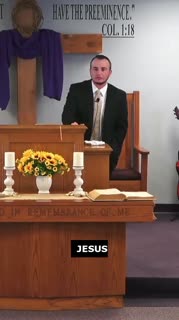Naaman's Journey: Faith, Humility, and Healing
Devotional
Sermon Summary
Bible Study Guide
Sermon Clips
1. "I have preached this text before, but it's been quite a while. I know it's been at least a few years, because I can remember some of the people that was here last time I preached it, and they're not here anymore, and they've been gone for a little while. So, not a good way to remember a message when you preached it, but I do remember it. So, anyways, a text you don't find preached all that often, but, man, what a good one. What a text to outline the truths of the doctrine of New Testament salvation." ([00:00:00] (28 seconds)
)
2. "You and I couldn't fulfill it 613 laws the Jews had the first 10 of them known as the Decalogue or the 10 commandments found in Exodus chapter 20 just 10 of them that summarize the other 603 of them and you couldn't keep them 10 either you failed miserably he said thou shalt not commit adultery and then Jesus steps on the scene and he says if you even look at a member of the opposite sex with lust in your heart you've committed adultery already every last one of us have done that male female doesn't matter you got blood in your body you've looked with lust we failed the covenant." ([00:02:29] (32 seconds)
)
3. "He said thou shalt not bear false witness against thy neighbor the Bible says in Revelation 20 that no liars will inherit the kingdom of God and every one of us have told a lie so I only told a little white liar only told one or two I don't tell them all the time you only got to murder one person to be called a murderer you only got to tell one lie to be called a liar you only got to steal one thing to be called a thief it don't matter how many times the bottom line is you've done it we've transgressed the law James 2 tells us this he says if we offend in one point we're guilty of all." ([00:04:55] (33 seconds)
)
4. "Naaman went to one man, and that man couldn't do nothing for him. But there's another man that sees Naaman's plight. He sees Naaman's situation. He sees Naaman's leprosy, and he said, That king, as mighty as he might have been, he can't do nothing for you. But Elisha spoke up, and he said, There's something I can do for you. And Elisha is a picture of the Lord Jesus Christ." ([00:11:10] (19 seconds)
)
5. "He tells him, hey, there's a way out of your plight. And that's where you as children of God, those of you that are already saved, the sinners that are bound in their sin, bound in their leprosy, they don't have any clue that there's a way out of the condition that they're in until somebody goes and tells them. And for the first time, Naaman hears the words, you can be made clean, can be washed. It can all be fixed for you, Naaman." ([00:12:23] (23 seconds)
)
6. "Naaman is sadly and unfortunately misled in this passage right here. And I want you to notice, verse number two through three, the woman tells Naaman's wife that there's a prophet that can heal her husband in Samaria. Samaria is the capital of Israel. In verse number four, somebody overhears the conversation between Naaman's wife and the Israelite woman." ([00:26:02] (22 seconds)
)
7. "Naaman is sent to the right place to be cleansed, but he goes to the wrong person. I'm going to make that make sense for you in a minute. He's sent to the right place to be cleansed. Verse number three, where is he supposed to go? To the prophet that is in Samaria, right? That's Israel. He's supposed to go to Samaria. He's supposed to go to Israel. If we look at verse number six, he goes to Israel. It says he brought the letter to the king of Israel, right?" ([00:26:39] (25 seconds)
)
8. "Naaman got told to go see the wrong person and a lot of you because of American culturized Christianity have been told to go to the right place and I'm glad you're in the house of God this morning you've been told to come to church you've been told to try to do good you've been told all those things and praise God that's wonderful but I'm the wrong person to cleanse you I can't cleanse you this ain't a person on these pews this morning that can cleanse you you're in the right place but you got the wrong man you might go talk to the king but the king can't fix it there's only one man who can do that and it's Christ Jesus the Lord." ([00:28:06] (34 seconds)
)
9. "Naaman's coming after Naaman's calling in verse number 8 we see Naaman coming in verse number 9 so Naaman came he's on his path to being healed he's getting there he's heard the voice from the right person and he says you know what I had it wrong but now I see this Elisha this is the man that can help me the king can't do it but Elisha can I'm coming Elisha he begins to come it says verse number 10 and Elisha sent a messenger unto him saying go and wash in the Jordan seven times and thy flesh shall come again to thee and thou shalt be clean." ([00:31:53] (33 seconds)
)
10. "Jesus doesn't sell experiences. He sells salvation. Well, he doesn't sell it either. I better change my wording on that. He gives it freely. It's a remote command and then it's a rudimentary command. Simple. That's what rudimentary means. It means element. Elemental. Just elementary. Easy. Simple. It's not complicated. Very simple to do. I'm so glad God made salvation simple just like that." ([00:35:04] (26 seconds)
)
Ask a question about this sermon
)
2. "You and I couldn't fulfill it 613 laws the Jews had the first 10 of them known as the Decalogue or the 10 commandments found in Exodus chapter 20 just 10 of them that summarize the other 603 of them and you couldn't keep them 10 either you failed miserably he said thou shalt not commit adultery and then Jesus steps on the scene and he says if you even look at a member of the opposite sex with lust in your heart you've committed adultery already every last one of us have done that male female doesn't matter you got blood in your body you've looked with lust we failed the covenant." ([00:02:29] (32 seconds)
)
3. "He said thou shalt not bear false witness against thy neighbor the Bible says in Revelation 20 that no liars will inherit the kingdom of God and every one of us have told a lie so I only told a little white liar only told one or two I don't tell them all the time you only got to murder one person to be called a murderer you only got to tell one lie to be called a liar you only got to steal one thing to be called a thief it don't matter how many times the bottom line is you've done it we've transgressed the law James 2 tells us this he says if we offend in one point we're guilty of all." ([00:04:55] (33 seconds)
)
4. "Naaman went to one man, and that man couldn't do nothing for him. But there's another man that sees Naaman's plight. He sees Naaman's situation. He sees Naaman's leprosy, and he said, That king, as mighty as he might have been, he can't do nothing for you. But Elisha spoke up, and he said, There's something I can do for you. And Elisha is a picture of the Lord Jesus Christ." ([00:11:10] (19 seconds)
)
5. "He tells him, hey, there's a way out of your plight. And that's where you as children of God, those of you that are already saved, the sinners that are bound in their sin, bound in their leprosy, they don't have any clue that there's a way out of the condition that they're in until somebody goes and tells them. And for the first time, Naaman hears the words, you can be made clean, can be washed. It can all be fixed for you, Naaman." ([00:12:23] (23 seconds)
)
6. "Naaman is sadly and unfortunately misled in this passage right here. And I want you to notice, verse number two through three, the woman tells Naaman's wife that there's a prophet that can heal her husband in Samaria. Samaria is the capital of Israel. In verse number four, somebody overhears the conversation between Naaman's wife and the Israelite woman." ([00:26:02] (22 seconds)
)
7. "Naaman is sent to the right place to be cleansed, but he goes to the wrong person. I'm going to make that make sense for you in a minute. He's sent to the right place to be cleansed. Verse number three, where is he supposed to go? To the prophet that is in Samaria, right? That's Israel. He's supposed to go to Samaria. He's supposed to go to Israel. If we look at verse number six, he goes to Israel. It says he brought the letter to the king of Israel, right?" ([00:26:39] (25 seconds)
)
8. "Naaman got told to go see the wrong person and a lot of you because of American culturized Christianity have been told to go to the right place and I'm glad you're in the house of God this morning you've been told to come to church you've been told to try to do good you've been told all those things and praise God that's wonderful but I'm the wrong person to cleanse you I can't cleanse you this ain't a person on these pews this morning that can cleanse you you're in the right place but you got the wrong man you might go talk to the king but the king can't fix it there's only one man who can do that and it's Christ Jesus the Lord." ([00:28:06] (34 seconds)
)
9. "Naaman's coming after Naaman's calling in verse number 8 we see Naaman coming in verse number 9 so Naaman came he's on his path to being healed he's getting there he's heard the voice from the right person and he says you know what I had it wrong but now I see this Elisha this is the man that can help me the king can't do it but Elisha can I'm coming Elisha he begins to come it says verse number 10 and Elisha sent a messenger unto him saying go and wash in the Jordan seven times and thy flesh shall come again to thee and thou shalt be clean." ([00:31:53] (33 seconds)
)
10. "Jesus doesn't sell experiences. He sells salvation. Well, he doesn't sell it either. I better change my wording on that. He gives it freely. It's a remote command and then it's a rudimentary command. Simple. That's what rudimentary means. It means element. Elemental. Just elementary. Easy. Simple. It's not complicated. Very simple to do. I'm so glad God made salvation simple just like that." ([00:35:04] (26 seconds)
)










